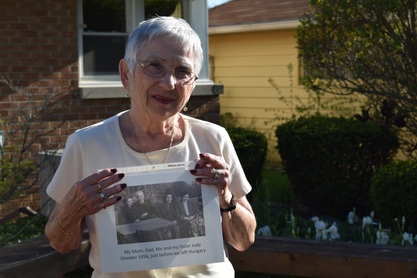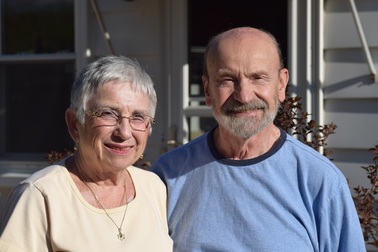
For Holocaust survivor Susie Fono, family is incredibly important.
Within moments of being graciously welcomed into the home of Susie and her husband, Bob, I was shown into a room adorned with lovely photos of family members, generations past and present. Susie and Bob have been a part of the Milwaukee community since May, 1957. They wed in Milwaukee where they raised two children, a legacy sure to include future photos.
Some of the photos are inclusive of an experience of such devastation that it’s impossible to capture with words, even with photographs. Susie is a Holocaust survivor. Some of her family members survived, some weren’t so fortunate.
It wasn’t until 2006 that Susie began telling her family’s story to large audiences. Since then, she has become a dedicated and highly involved member of the Speakers Bureau of Holocaust survivors, a valuable component of the Nathan and Esther Pelz Holocaust Education Resource Center (HERC) located on Milwaukee’s East Side. Through coordination with HERC, Susie, and other survivors, travel throughout the state in order to speak to groups of children and adults, students and community members. They tell their personal stories of survival during the Holocaust, one of the darkest times in the history of the world.
Susie was born in Budapest, Hungary, in 1937, to a close and loving family that included her parents, an older sister named Judy, and doting grandparents. Some of her earliest childhood memories were playing on the banks of the Danube River with her friends, hiking in the Buda Hills, ballet lessons and visiting her grandparents.
These happy childhood moments abruptly ceased in 1940 when her father, a successful businessman in the Hungarian grain exchange, was forcibly taken away to a labor camp. A few months later, her father and other inmates were loaded onto a train and shipped to a different camp. Thankfully, someone managed to pry the small train window open whereupon Susie’s father narrowly escaped, miraculously returning home to his wife and two daughters.
Soon after his return, their immediate family moved into a ghetto where they lived in an apartment with eight other people. In another fortunate turn of events, on January 18, 1945, Susie’s Uncle Gyozo snuck the family out of the ghetto and they returned to their old family apartment. They remained there through the end of the war.
Within moments of being graciously welcomed into the home of Susie and her husband, Bob, I was shown into a room adorned with lovely photos of family members, generations past and present. Susie and Bob have been a part of the Milwaukee community since May, 1957. They wed in Milwaukee where they raised two children, a legacy sure to include future photos.
Some of the photos are inclusive of an experience of such devastation that it’s impossible to capture with words, even with photographs. Susie is a Holocaust survivor. Some of her family members survived, some weren’t so fortunate.
It wasn’t until 2006 that Susie began telling her family’s story to large audiences. Since then, she has become a dedicated and highly involved member of the Speakers Bureau of Holocaust survivors, a valuable component of the Nathan and Esther Pelz Holocaust Education Resource Center (HERC) located on Milwaukee’s East Side. Through coordination with HERC, Susie, and other survivors, travel throughout the state in order to speak to groups of children and adults, students and community members. They tell their personal stories of survival during the Holocaust, one of the darkest times in the history of the world.
Susie was born in Budapest, Hungary, in 1937, to a close and loving family that included her parents, an older sister named Judy, and doting grandparents. Some of her earliest childhood memories were playing on the banks of the Danube River with her friends, hiking in the Buda Hills, ballet lessons and visiting her grandparents.
These happy childhood moments abruptly ceased in 1940 when her father, a successful businessman in the Hungarian grain exchange, was forcibly taken away to a labor camp. A few months later, her father and other inmates were loaded onto a train and shipped to a different camp. Thankfully, someone managed to pry the small train window open whereupon Susie’s father narrowly escaped, miraculously returning home to his wife and two daughters.
Soon after his return, their immediate family moved into a ghetto where they lived in an apartment with eight other people. In another fortunate turn of events, on January 18, 1945, Susie’s Uncle Gyozo snuck the family out of the ghetto and they returned to their old family apartment. They remained there through the end of the war.

In 1956, Susie and her sister Judy moved to the United States. Seven years later, their parents entered the same shores as their daughters. Though her parents have since passed away, Susie continues to tell her family’s story.
The sad reality is that Holocaust memory is in jeopardy as we are quickly lose the survivors who currently act as living witnesses to the horrors of the Holocaust. These men and women, who have for so long carried on the memories of those lost in their own testimonies, are slowly passing, leaving the responsibility of remembrance to the personal narratives of those who remain alive. Despite these concerns, the Nathan and Esther Pelz Holocaust Education Resource Center and its Speakers Bureau will continue fulfilling its important mission to bring awareness of the hatred and prejudice exhibited in the Holocaust. It further acts to inspire ethical behavior in present and future generations in the hopes that such atrocities to humankind should never occur again.
The Nathan and Esther Pelz Holocaust Education Resource Center consists of multifaceted programs and resources, including the Speakers Bureau, a group of second generation speakers, professionally trained Holocaust Educators, a library, Holocaust curriculum. Community programs include book talks, public lectures, and films. The Nathan and Esther Pelz Holocaust Education Resource Center is determined to continue its work in Milwaukee and in the greater Wisconsin community.
Fortunately, HERC has the honor of working with dedicated volunteers like Susie Fono. It will continue to facilitate these incredibly important Holocaust survivor visits to schools and community organizations around the state, so long as time remains for our survivors. These survivors selflessly tell their stories to engaged audiences, volunteering their time and efforts, oftentimes in the midst of declining health. In fact, many of the Speakers Bureau members are approaching their early to mid-90s. One survivor still volunteers to tell her story as a young 97 year old!
When Susie Fono visits schools, she hopes students will gather from her story the important message of tolerance and diversity. She encourages students to get to know people who come from different backgrounds, culturally or religiously, than their own. And she also encourages them to love their family.
“How many of you have spoken to your old grandmother on the phone recently?” Susie asks students. To Susie, family is not to be taken for granted, a luxury that was stolen from her. She remembers the last time she spent time with her maternal grandparents, Rose and David, before they were taken away to their deaths in 1944. “Grandma Rose,” said Susie, “let me sit on a little stool in the kitchen and talked to me while she was cooking. Wearing a grey suit, she had her hands on her hips, smiled at me, and called me her ‘little flower’.” These are the precious memories of lives lost during the Holocaust that are on the verge of being forgotten. But thanks to survivors like Susie Fono who tell their stories, they carry on.
View full PDF of article here.
The sad reality is that Holocaust memory is in jeopardy as we are quickly lose the survivors who currently act as living witnesses to the horrors of the Holocaust. These men and women, who have for so long carried on the memories of those lost in their own testimonies, are slowly passing, leaving the responsibility of remembrance to the personal narratives of those who remain alive. Despite these concerns, the Nathan and Esther Pelz Holocaust Education Resource Center and its Speakers Bureau will continue fulfilling its important mission to bring awareness of the hatred and prejudice exhibited in the Holocaust. It further acts to inspire ethical behavior in present and future generations in the hopes that such atrocities to humankind should never occur again.
The Nathan and Esther Pelz Holocaust Education Resource Center consists of multifaceted programs and resources, including the Speakers Bureau, a group of second generation speakers, professionally trained Holocaust Educators, a library, Holocaust curriculum. Community programs include book talks, public lectures, and films. The Nathan and Esther Pelz Holocaust Education Resource Center is determined to continue its work in Milwaukee and in the greater Wisconsin community.
Fortunately, HERC has the honor of working with dedicated volunteers like Susie Fono. It will continue to facilitate these incredibly important Holocaust survivor visits to schools and community organizations around the state, so long as time remains for our survivors. These survivors selflessly tell their stories to engaged audiences, volunteering their time and efforts, oftentimes in the midst of declining health. In fact, many of the Speakers Bureau members are approaching their early to mid-90s. One survivor still volunteers to tell her story as a young 97 year old!
When Susie Fono visits schools, she hopes students will gather from her story the important message of tolerance and diversity. She encourages students to get to know people who come from different backgrounds, culturally or religiously, than their own. And she also encourages them to love their family.
“How many of you have spoken to your old grandmother on the phone recently?” Susie asks students. To Susie, family is not to be taken for granted, a luxury that was stolen from her. She remembers the last time she spent time with her maternal grandparents, Rose and David, before they were taken away to their deaths in 1944. “Grandma Rose,” said Susie, “let me sit on a little stool in the kitchen and talked to me while she was cooking. Wearing a grey suit, she had her hands on her hips, smiled at me, and called me her ‘little flower’.” These are the precious memories of lives lost during the Holocaust that are on the verge of being forgotten. But thanks to survivors like Susie Fono who tell their stories, they carry on.
View full PDF of article here.
